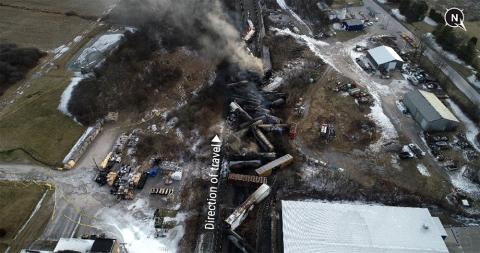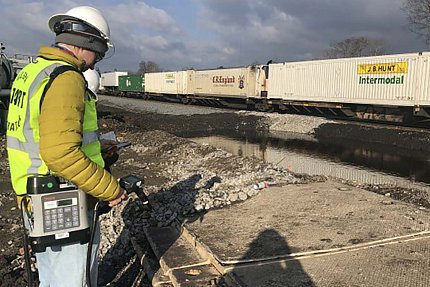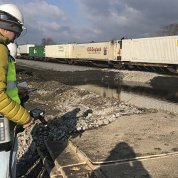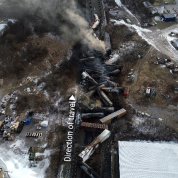Six NIEHS Grants Announced to Study Health Effects of Ohio Train Derailment

Photo: National Transportation Safety Board
It was the evening of Feb. 3, 2023, when a Norfolk Southern Railway Company train carrying hazardous materials derailed in the village of East Palestine, Ohio. Some of the train cars caught fire and some spilled their loads onto the ground. These substances traveled into local waterways and flowed miles downstream.
For the past year, many local, state and federal agencies, including the National Institute of Environmental Health Sciences (NIEHS), have been part of a coordinated response to support the communities affected by the derailment in East Palestine and surrounding areas of Ohio and Pennsylvania.

Photo: Environmental Protection Agency
From the early days of the disaster, NIEHS has been actively engaged to understand the community concerns about potential health impacts, and to identify opportunities for needed research. Much of this was done through NIH’s Disaster Research Response (DR2) Program.
During a visit to East Palestine on Feb. 16, 2024, President Joe Biden acknowledged the “herculean efforts” made by the community and agencies since the tragedy. He announced the award of six NIH “grants to some of America’s best research institutions to study the short- and long-term impacts of what happened here.”
NIEHS made the awards through its Time-Sensitive Research Grants Program to conduct research and community engagement activities in East Palestine. Many of the grantees have already been working in the area and have established good working relationships with the community. The six recipients are:
- Case Western Reserve University | Healthy Futures Research Study: Linking Somatic Mutation Rate with Baseline Exposure
Principal Investigator (PI) Dr. Fredrick Ray Schumacher and team will engage community partners and talk with East Palestine residents to better understand their experiences and concerns during and after the disaster. The team will also collect, and store for future research, blood and saliva samples and analyze them to understand how the mixtures of chemicals impact health both short- and long-term.
- Texas A&M University | Responding to Air Pollution in Disasters Air Sampling and Symptom Monitoring
PI Dr. Natalie Johnson and team will apply a mobile air-sampling strategy to rapidly characterize potential health risks from hazardous volatile organic compound exposure in the aftermath and recovery phases of the East Palestine environmental disaster.
- University of California, San Diego | Uncovering the Short-Term Public Health Impact of Toxin Release: Outcomes and Effect Modifiers
PI Dr. Beatrice Golomb and colleagues already have a community partnership in East Palestine and have conducted interviews with affected residents. The researchers will begin recruiting a cohort of residents to assess the short-term (approximately two to three years) health impact of being exposed to a mixture of toxins.
- University of Kentucky | East Palestine Train Derailment Health Tracking Study
PI Dr. Erin Haynes leads a research project that will include a health tracking study (via an online survey) to collect longitudinal measures of health symptoms, stress and well-being of East Palestine residents. A researcher network will also be established to help report back and disseminate research findings successfully to the community.
- University of Pittsburgh | Profiling the Post-Accident Exposome
PI Dr. Peng Gao leads a research project that will collect soil, water and sediment samples to capture the extent of the contamination and to document the ongoing impact on the local environment of this region and its highly interconnected waterways.
- University of Pittsburgh | East Palestine Community-Engaged Environmental Exposure, Health Data and Biospecimen Bank
PI Dr. Juliane Beier will lead a research project that will use citizen science strategies to engage community members actively in collecting environmental samples, biospecimens and health outcome data to better understand the interaction of psychosocial stress and vinyl chloride exposure on their health and to find ways to reduce the immediate and long-term impacts of these exposures.
To learn more about time-sensitive research, visit https://www.niehs.nih.gov/research/supported/timesensitve.
To read details of the East Palestine grants, go to https://go.nih.gov/LJa7SUw.








